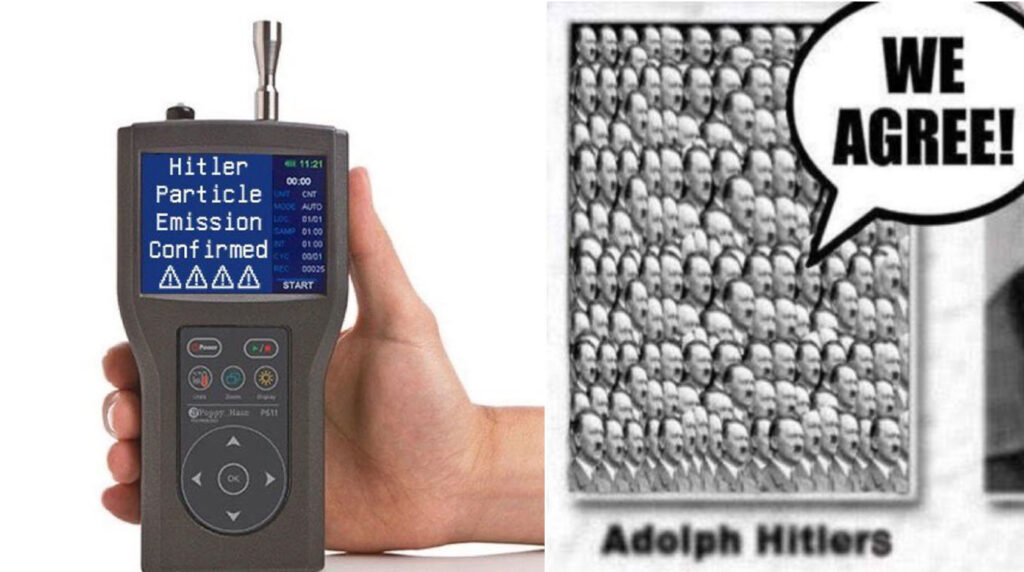In the vast landscape of the internet, memes have become the currency of humor, providing a unique form of expression that transcends cultural and linguistic barriers. One such peculiar meme that has emerged in recent times is the “Hitler Particles” meme. This enigmatic meme combines historical references with scientific jargon, creating a bizarre and often controversial blend of humor that has captivated online communities.
The Genesis of the Meme
The “Hitler Particles” meme did not have a traditional birth, but rather, it evolved organically through the collective creativity of internet users. It draws its inspiration from the historical figure Adolf Hitler, infamous for his role in World War II and the Holocaust. However, the meme takes an unexpected turn by introducing the concept of “particles,” which are not associated with Hitler in any scientific or historical context.
The meme typically features an image of Adolf Hitler accompanied by a caption that humorously suggests the existence of imaginary particles named after him. This juxtaposition of a historical villain with scientific terminology creates a surreal and absurd scenario that captures the attention of online audiences.
Scientific Terminology in Humor
One of the intriguing aspects of the “Hitler Particles” meme is its incorporation of scientific terminology. The use of words like “particles” implies a connection to physics or chemistry, disciplines that are not commonly associated with internet humor. This blending of seemingly unrelated domains adds an element of intellectual playfulness to the meme, appealing to a diverse audience with varied interests.
It’s important to note that the scientific terminology used in the meme is entirely fictional. There is no legitimate scientific concept or discovery related to “Hitler particles.” Instead, the meme relies on the audience’s willingness to suspend disbelief and engage in the absurdity for the sake of humor.
Controversial Nature
While memes are generally meant to be lighthearted and humorous, the “Hitler Particles” meme has sparked controversy due to its use of a figure associated with unspeakable atrocities. Adolf Hitler remains a symbol of hate and intolerance, and any attempt to trivialize or make light of his actions is understandably met with criticism.
The controversy surrounding the meme raises questions about the boundaries of humor and the ethical considerations involved in creating and sharing content online. Some argue that humor can be a powerful tool for coping with dark aspects of history, while others contend that certain subjects should remain off-limits to prevent the trivialization of historical atrocities.
Internet Culture and Remixing
The “Hitler Particles” meme exemplifies the dynamic nature of internet culture, where users remix and repurpose content to create new and unexpected forms of humor. Memes often serve as a reflection of the collective consciousness of online communities, providing a space for users to engage in shared cultural references and inside jokes.
In the case of the “Hitler Particles” meme, its popularity can be attributed to its ability to subvert expectations and challenge traditional notions of humor. The unexpected pairing of a historical figure with scientific concepts creates a cognitive dissonance that elicits laughter from those who appreciate the absurdity of the juxtaposition.
The Evolution of Memes
Memes, by their nature, are transient and subject to rapid evolution. The “Hitler Particles” meme, while currently in the spotlight, may soon give way to new trends and internet phenomena. The ever-changing landscape of online culture ensures that memes remain fresh and relevant, allowing for the continual emergence of creative and unexpected content.
Conclusion
The “Hitler Particles” meme stands as a testament to the unique and often unpredictable nature of internet humor. Its combination of historical references, scientific terminology, and controversy has propelled it into the spotlight, sparking discussions about the boundaries of comedy and the ethics of using sensitive subjects for amusement.
As internet culture continues to evolve, memes will undoubtedly play a central role in shaping the way we communicate and express ourselves online. The “Hitler Particles” meme, with its blend of absurdity and controversy, serves as a reminder of the internet’s ability to generate unconventional and thought-provoking content that resonates with a global audience.







